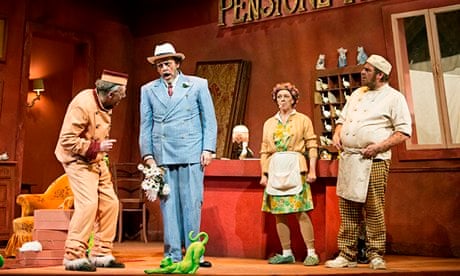Scottish Opera sorely need a triumph after an autumn dominated by management crisis and artistic drift. As one of only three full-scale operas they stage this season, the pressure is on for their new production of Don Pasquale to compensate in fizz and vibrancy for what the 2013-14 programme lacks in substance. The show is by no means a flop, but it's not a triumph, either
French-Canadian director/designer team Renaud Doucet and André Barbe update Donizetti's 1843 comedy to 1960s Rome, where Don Pasquale owns a shabby pensione and his nephew Ernesto manages the reception. The period suits the opera's inherent generation clash: it's entirely plausible that the ageing Pasquale feels out of touch, that the youth flagrantly disrespect him and that Norina's spending spree escalates into La Dolce Vita decadence. The visuals are less convincing. Barbe goes for comic-strip gaudy: lurid colours, overblown angles, a cartoonishly decrepit hotel stuffed with kitsch trinkets. Much is made of Pasquale's cat fetish. There are some clever tricks, such as the washing lines hauled up or down to focus attention on different parts of the action, and the retro fotoromanzo neatly setting the scene during the overture. The problem is that the cartoon set reduces the characters to cartoon cut-outs. That's already a risk in an opera that draws from commedia dell'arte, but a perceptive production can quickly delve beyond those stereotypes. Barbe and Doucet deliver plenty of brash and busy frills, less by way of real character intrigue.
The exception is Pasquale himself. Alfonso Antoniozzi plays the grouchy, dirty title role not as the classic fool, but with real compassion and poignancy. Aldo di Toro's Ernesto is a simple, lovable lad with a sweet, ardent tenor (his Com'e Gentil is a highlight), and Nicholas Lester's smooth Malatesta completes a strong trio of male leads. The chorus sound vibrant, even if they look daft done up as technicolour holidaymakers. Making her debut as Norina is Ruth Jenkins-Róbertsson, a 26-year-old soprano who is clearly going places. She isn't quite quixotic enough to pull off the femme fatale, but she has all the light, bright high notes for the role – an initially steely edge to her voice softened up through the night. Scottish Opera's former music director Francesco Corti delivers a crisp and chunky romp through the score, as loud as Norina's leopard-print maxi dress.

Comments (…)
Sign in or create your Guardian account to join the discussion